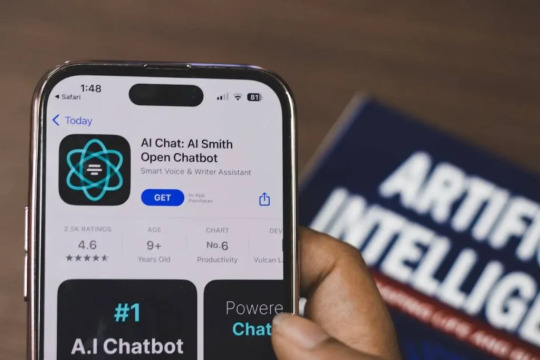Don't wanna be here? Send us removal request.
Text
AI for Personalization: How Thought Leaders Are Paving the Way for Customized User Experiences
From the first moments technology became a world shaper, humans have dreamed of tech that understands them better than they understand themselves. Today, that dream isn’t science fiction any longer. It’s a tangible reality. Using AI for personalization is the next exciting step in business development. With it comes the potential to reshape how businesses connect with their customers. Today, we will unpack how thought leaders are reshaping user experiences and what that means for companies globally.
The Power of Personalized Experiences
At one point, the only tool available to marketers was the hard sell. Blanket advertisements and “papering the town” with your products was the only way to get known. Sure, it might have got results. But it also involved a lot of waste and low ROIs for immense effort.
Today, we live in a completely reshaped landscape. As the digital boom took hold, we found more and more ways to focus our efforts on what really mattered to customers. No more hoping that the right customer found your advertisement in a sea of them. Now, you can take your product to their very inbox. But with that came a whole new ballgame.
As more and more “digital chatter” intrudes on our limited time and attention spans, it’s more important than ever to stand out from the crowd. You need to be talking to the right person, with the right interest, in a way that speaks to them. People no longer accept cookie-cutter solutions that kind of fit. They want to feel the value of the solutions they choose. And they want them to fit their precise needs.
The Rise of Personalization

Enter personalization. Far from just a marketing buzzword, it’s now a business staple. Customers demand solutions that fit perfectly. Solutions that meet their exact needs or interest and ensure the smoothest possible result. If they’re seeking help, they don’t want a lengthy hold time to get the same answer you gave the last guy. After all, why waste your limited time on things you sort-of like? Especially when right next door is the perfect fit.
As AI evolves, it has handed us an incredibly powerful opportunity. Think about how Netflix recommends shows you’ll love or how Amazon suggests products that seem to read your mind. These aren’t lucky guesses—they’re the result of smart, adaptive technology that’s changing the game for businesses everywhere. The transformative potential of AI customization means creating a truly personalized customer experience is easier than ever. AI for personalization has stepped up to bat and it plays to win.
What Makes Using AI for Personalization Special?
How is that any different from using existing personalization techniques, however? We could spend time hyping AI’s abilities to save time and costs, but that’s not where AI customization’s real power lies.
Prior attempts at personalization still require some hope and wastage. Sure, you can create buyer personas and do your due diligence. But you’re still talking about demographics, statistics and personas, not real people.
Your data can strongly suggest what your customer wants. But it still can’t reach into their heads (or hearts) to make certain you’ve hit the mark. Plus, you have to do all that time-consuming groundwork to get there.
AI customization, on the other hand, works with real data from real people. It’s not tailoring its responses to a market segment, but to a specific individual. It can crunch the numbers and correlate the data far faster than the best human minds. And it can do it 24/7, no breaks required.
The Thought Leadership Behind AI Customization
At its core, using AI for personalization is about creating experiences uniquely tailored to each individual. It’s like having a super-smart assistant who knows exactly what you need before you ask. For business owners, this means:
Deeper customer connections
More effective marketing
Increased customer satisfaction
Better understanding of user behavior
Current AI development, paired with the groundbreaking work from global thought leading companies like AI-First Mindset™, has made it a reality. Some of the brightest minds in technology are pushing the boundaries of what’s possible with personalized AI. Companies like Google and Adobe are developing AI systems that can:
Predict customer preferences
Create highly targeted marketing messages
Adapt in real-time to user interactions
Now, we have algorithms that can understand customer emotions through communication patterns. Personalized AI chatbots can now detect frustration, excitement or confusion—and respond accordingly.
The Rise of Personalized AI Chatbots and AI Customization

Chatbot was once a word accompanied by much eye rolling. Robotic, one-size-fits-all responses of the past frustrated as much as they helped. Now, modern personalized AI chatbots are like digital chameleons, changing their approach to match each unique user:
They learn from every interaction
Understand context and nuance
Provide human-like, helpful responses
Instead of frustrating menu systems, users now get instant, personalized support that feels like talking to a knowledgeable friend. But it’s not all smooth sailing. AI customization comes with important considerations:
Privacy Matters: Businesses must be transparent about how they use personal data
Ethical Boundaries: Using AI for personalization shouldn’t feel invasive
Balance is Key: Too much personalization can feel creepy, too little feels impersonal
However, with future AI developments, we can also look forward to using AI for personalization even more effectively. Imagine delivering customer service that:
Predicts your needs before you know them,
Creates entirely personalized product experiences, and
Helps businesses understand their customers on a deeper level
It’s time to stop imagining. That future is now, if you’re ready to embrace it. Businesses are already seeing incredible results with tech like personalized AI chatbots, reporting:.
Up to 70% increase in sales, even where customers prefer human agents
Significant improvements in customer loyalty
More efficient marketing spend
Your Business and AI Customization
The message is clear: AI customization isn’t just for tech giants. SMBs can now access the same powerful personalization tools.Ones that were unimaginable just a few years ago. Despite all the technological magic, however, remember that AI is a tool—not a replacement for genuine human connection. The best use of AI for personalization should feel helpful, not intrusive. It needs to be genuine and well thought out, not yet another marketing gimmick.
AI for personalization is transforming how businesses interact with their customers. It’s about creating experiences that feel wonderfully personal, incredibly helpful and just a little bit magical. In short, the future is personalized and it’s happening right now. If you’re ready to embrace AI customization in your own business, it’s time to reach out to AI-First Mindset™. You can leverage our extensive experience and position as a global thought leader in AI to help you embrace the true power of AI customization for your business needs.
0 notes
Text
AI Optimization Solution


Using AI for personalization will transform customer interactions for good. It’s time to embrace tailored, intelligent experiences that drive business growth.
0 notes
Text
How AI for Personalization will Transform Business Goals
Using AI for personalization will transform customer interactions for good. It’s time to embrace tailored, intelligent experiences that drive business growth.
0 notes
Text
AI Integration Consulting


Gain an in-depth understanding of ethical AI and the human-AI collaboration set to drive the future of artificial intelligence.
0 notes
Text
AI Business Automation

AI business automation means using smart technology to handle daily tasks in a faster, easier, and more efficient way. It helps save time, reduce errors, cut costs, and improve customer service. By using AI tools, businesses can work 24/7 and let their teams focus on more important work. It's a smart step toward growing and improving your business in today’s digital world.
0 notes
Text
AI Customer Support: Enhancing the Customer Experience
AI has massive potential for businesses in all niches. Perhaps its most transformative niche, however, is in making customer service better. Many companies have already embraced AI customer support. In fact, when you contact customer support, you might be talking to an AI assistant without even knowing it! AI has immense power to help businesses provide faster customer service. Today, we explore just some ways AI is changing how companies help their customers.
How AI Customer Support Makes Service Better
As we’ve noted before on the blog, AI is best thought of as a super-helpful digital assistant that never gets tired. Anyone who has worked in customer service knows how invaluable that could be. AI can answer customer questions 24 hours a day, 7 days a week. Now, picture your customers enjoying that constant access. No more waiting until Monday or after lunch to get the help they need.
Of course, generative AI in customer experience is still a tool, not a master. It can’t understand every single niche customer query it encounters. However, AI assistants can handle many common customer questions right away. Think of simple, common queries like “Where’s my package?” or “What is my account balance?”.
AI can help with that in seconds. This means customers get answers faster and don’t have to wait for a human agent to become available. For those with complex issues to address, AI customer support can forward the matter to a human to deal with properly.
Real Examples of Generative AI in Customer Experience
You have already seen generative AI in customer experience in action. Think of those pop-up chat boxes that are now common on most websites. These chatbots use generative AI to understand customers’ questions and provide helpful answers.
Big companies like Amazon and Apple are already using AI to figure out what customers might need help with. Often before they even ask! For example, if you’ve bought something recently, the AI might show you tracking information as soon as you contact customer service.
As you can see, the results are subtle and aren’t always a case of AI ‘pretending to be customer support.’ Instead, AI has become a useful tool to simplify the support cycle while still allowing for human help where needed.
Making Things Personal with AI Customer Support
Personalization has become a key marketing tool. People don’t want to see things that are sort of relevant to them. They want direct, relevant and personal suggestions.
AI can ‘remember’ previous conversations with individuals. This allows it to personalize responses and other cues for the user. If you’ve talked to customer service before about your shoe size, the AI will remember that next time you shop. This makes the experience feel more personal, like talking to someone who knows you.
AI can also offer smart suggestions based on what customers usually buy. It can recommend other things people may like and easily offer that coveted personalized experience.
Helping Human Agents Do Better

So, AI isn’t a replacement for a great customer service team. It’s another team member who helps them work better. When customers have complicated problems, AI can quickly give the human agents all the important information they need.
This means the agent can focus on solving the problem instead of searching for information. The AI agent can offer advice directly when the inquiry is simple and straightforward. This leaves the human agent ready to help the next person in the queue with a complex query.
Making Sure Customers Are Happy
Using generative AI in customer experiences also lets businesses police their service. AI can analyze customer feedback, reviews and even the tone of voice in phone calls to understand how customers really feel.
The quicker you can spot a customer service issue, the better you can respond to it. It’s also useful to tell who is simply ‘having an opinion’ and where there is a genuine service issue. This lets you take any steps needed to address the matter.
Nor has generative AI in customer experiences reached its full potential yet. Developers are working hard to help AI customer support better understand emotion, solve complicated problems and predict customer needs. They’re also working hard to improve how it communicates. There’s a bright future ahead for human-AI collaboration.
Making AI Customer Support Work Better for Everyone

Using generative AI in customer support has benefits for everyone concerned. For business owners, AI in customer service means:
Helping more customers without hiring more staff
Keeping support services running 24/7 without extra cost
Understanding customer needs better
Making sure problems get fixed faster
On the other side, for customers, it means:
Getting help right away, any time of day
Not having to explain the same problem multiple times
More personalized service
Faster solutions to common problems
In short, the future of generative AI in customer experience is burning brightly. The key for businesses looking to implement AI customer support is to start small and build from there. Trial a simple chatbot trained on your most common service questions. Begin to use AI tools to organize your customer information.
Once you have a few implementations in place, you can add more as you learn what works. And always remember: AI works best when it’s part of a team. The goal is to make things better for your customers, not to replace human connection completely.
AI customer support has immense potential to reshape customer service for the better. It’s helping businesses provide faster, more personal service while making things easier for both customers and employees.
As AI keeps getting better, we can expect even more improvements in how generative AI customer experiences help businesses help their customers. If you’re ready to embrace the potential of AI customer support for your business, reach out to AI-First Mindset™ today to help you get started.
0 notes
Text
Business Shift: AI Trends Changing The Game
AI Trends That Are Shaping The Future of AI in Business. Here’s what’s really happening and why it matters more than ever.
0 notes
Text
Artificial Intelligence: Benefits to Society and the Economy
AI has changed how we live and this technology is only just getting started. Whether you like to fire up the smart assistant in your phone or plan complex business systems, AI is reshaping our world in exciting ways. We are exploring how artificial intelligence benefits society and drives economic growth. What this means for businesses and communities. Let’s take a look.
How AI is Transforming Our Daily Lives
The impact of AI in society goes far beyond our imagination. In fact, for many of us, AI is just a buzzword. Something you stumble across on your newsfeed or socials. A cool new technology, but not something relevant to you — right?
Wrong. You would be surprised how often you use AI without even knowing it. When Netflix suggests your next favorite show or Google Maps finds the quickest route home, that’s AI working for you. And your 5G network on your phone? It’s likely using AI network slicing to help deliver better, faster service, too.
The role of AI in the economy is only set to grow, making our lives easier and more efficient. While there has been a lot of “buzz” about splashy features and programs like ChatGPT, that’s not where AI’s true potential lies. The reality is even more exciting.
AI in the Economy
The role of AI in the economy continues to grow stronger each year. Yes, it continues! While many lay people first thought of AI as a business tool in late 2022, when ChatGPT was released, it has been around much longer. All the time working behind the scenes to help us.
Artificial intelligence has come a long way since its initial development in the 1950s. The term was first coined at a conference at Dartmouth College in 1956. Researchers were already exploring ways to make computers “think” like humans. Of course, we aren’t quite there yet, but some modern large language modules can feel like it.
Early AI was basic, focusing on simple problem-solving and game-playing. The field saw its first breakthrough in the 1960s with ELIZA, a computer program that could mimic human conversation.
However, in the late 1990s and early 2000s, AI tools began to show real, practical value. Primarily thanks to increased computing power and better data storage. The real game-changer came in the 2010s, when machine learning and deep learning became more sophisticated, leading to tools like Siri (2011), IBM’s Watson (2011) and deep learning systems that could beat humans at complex games.
Today’s AI tools, from chatbots to image recognition software, build on these foundations but are far more powerful and accessible, making them practical for businesses of all sizes to use in their daily operations. Artificial intelligence in society is finally a meaningful force.
As the tools have become more sophisticated, businesses are finding new ways to use them. Many of these solutions increase productivity and create new opportunities. Let’s look at some key areas where AI is making a difference.
Boosting Business Efficiency

Efficiency is every business’s watchword. Luckily, AI in the economy has a lot to offer regarding time savings and improved efficiency. Companies are using AI to streamline their operations in several ways.
Automating Routine Tasks
AI excels at handling repetitive work that used to eat up valuable employee time. That means tasks like data entry, sorting emails, or processing invoices. For example, AI can now scan and process hundreds of receipts in minutes, a job that might take a person several hours. Those hours are wasted. The person is neither using their skill set nor driving productivity. They’re just sorting paper so they can, eventually, get to work.
This sort of innovation is key in artificial intelligence’s benefits to society. It frees up staff to focus on work that needs a human touch, like building customer relationships or solving complex problems.
Smart Decision-Making with Data
Automation is one of the key artificial intelligence benefits to society, but it is far from the only one. AI models excel at spotting patterns in business data—the sort of patterns humans often miss.
This means AI tools can analyze sales information, customer behavior patterns and market trends. Often all at once. This helps business owners make smarter decisions about things like:
When to order more inventory
Which products to promote
What times to schedule more staff
How to price products competitively
Supply Chain and Inventory Magic
AI in the economy also plays a vital role in managing supplies and products. Modern inventory systems, with a little pinch of AI, can:
Predict when you’ll run out of items before it happens
Suggest the perfect time to order more stock
Spot potential supply chain problems early
Reduce waste by ordering just the right amount
Track products from factory to store shelf in real-time
Customer Service Excellence
Customer service is the backbone of the economy. Yet, it can also be a massive time sink. Few customer queries really need human expertise. Most are simply run-of-the-mill questions, common issues and simple troubleshooting. Today, AI-powered chatbots and virtual assistance can help you:
Answer common customer questions instantly
Help customers find products they’ll love
Handle basic support issues 24/7
Route complex problems to the right human expert
Remember customer preferences for better service
Process Improvement
Who wouldn’t want an expert in their pocket? Even the most successful business falls prey to bloated processes. Things often start ultra-efficient but can easily crumble into bloated structures. No one thinks to ask why a one-step process takes three steps. But your AI will.
AI tools are like having a constant efficiency expert on staff. They can:
Map out business processes to find bottlenecks
Suggest ways to streamline operations
Reduce errors in paperwork and data entry
Automate quality control checks
Keep track of compliance requirements
Cost Control
Another major benefit of AI to the economy lies in cost control. AI helps streamline, simplify and cut down. It also identifies patterns excellently and can proactively act when it detects specific needs. This makes AI essential for tight cost control, helping businesses to:
Reduce errors that cost money to fix
Cut down on wasted materials and time
Find better deals on supplies
Manage energy use more efficiently
Predict maintenance needs before expensive breakdowns
The best part? These AI tools are now affordable enough for small businesses to use. You don’t need a vast tech budget to start seeing real benefits in your daily operations.
The Thorny Job Issue: AI and Creating New Jobs and Industries
Historically, when new technology enters, jobs often leave. It’s inevitable in any changing work environment that we see shifts in job needs, titles and availability. Many worry about AI replacing jobs wholesale. The opposite, however, is true. As companies adopt AI technology, they need people who can:
Develop and maintain AI systems
Analyze data and make sense of AI insights
Train others to work with AI tools
Manage AI projects and implementation
These new roles often pay well and offer exciting career paths. AI’s growth in the economy also creates opportunities for people to learn new skills and take on more interesting work.
Artificial Intelligence Benefits to Society

So, we’ve looked at AI in the economy. But, as important as work is, it’s not all there is in life. Artificial Intelligence in society has the potential to revolutionize the world. Breakthroughs in many key areas are looming or already here. Here are a few areas where AI is making the world a better place.
Making Healthcare Better and More Accessible
This may, in fact, be the biggest way artificial intelligence benefits to society will be felt. Healthcare is notoriously unequal. Many of the poorest among us cannot even access a doctor, let alone lifesaving treatments. Think of rural villages and towns without large hospitals.
One of the most critical ways artificial intelligence benefits society is through healthcare improvements. AI-powered tools help doctors spot diseases earlier and create better treatment plans. For example, AI systems can scan X-rays and identify potential problems faster than human experts. This means patients can get treatment sooner, leading to better outcomes.
AI can also help prevent medical issues through expanded access to healthcare information. Doctors can use AI’s data crunching and pattern recognition to offer personalized solutions and programs to patients. They can use AI’s predictive analysis to improve treatment outcomes and scan for likely red flags, making preventative screening more efficient.
Machine learning systems are also making healthcare more accessible to people in remote areas. Patients can get initial diagnoses and medical advice through AI-powered telehealth platforms without traveling to a doctor’s office. This is especially helpful for people in rural communities or those with limited mobility. We have even seen the first remote surgeries take place with AI’s help.
Retail and E-commerce
Artificial intelligence benefits society through more innovative shopping experiences. Online stores use AI to:
Show personalized product recommendations
Predict inventory needs
Detect fraud
Handle customer service questions
This makes shopping more convenient for customers while helping businesses run more efficiently. Small business owners can now use AI tools that were once only available to large companies. This helps to equalize the playing field and make business fairer. A small vendor in Calcutta can compete more meaningfully with the “big boys” without inflated staff and infrastructure costs.
Manufacturing and Production
Manufacturing and production are the backbones of human society. Yet many of these industries’ jobs could be safer and less complex. AI tools not only streamline and improve productivity, but they can also make manufacturing safer and better for humans.
Smart factories use artificial intelligence in society to:
Predict equipment maintenance needs
Ensure product quality
Optimize production schedules
Reduce waste and energy use
These improvements help companies make better products while using fewer resources. Staff are less exposed to more dangerous activities. This is good for society, the economy and the environment. That’s a win for everyone.
Financial Services and Security
With the rise of the tech age came the rise of cybercrime and fraud. Sadly, wherever people go, criminals follow. AI gives us immense potential to detect and ward off these security risks by detecting unusual transactions that might be fraudulent. AI can beef up security measures. It can also respond instantly if unusual traffic is detected. No more waiting around hoping a human catches fraud.
This makes financial services more accessible and secure for everyone. It’s another example of how AI in the economy helps both businesses and consumers.
Making Education Better Through AI
Much as with healthcare, great education is a cornerstone of society. Yet, challenges in education access are rife. It’s a major source of global inequality. However, education is changing thanks to artificial intelligence benefits to society. AI-powered learning tools can:
Adapt to each student’s learning pace
Provide instant feedback on assignments
Help teachers identify students who need extra help
Make learning more engaging through personalisation
These improvements help students learn better while making teachers’ jobs easier. As more schools adopt AI tools, education becomes more effective and accessible. Likewise, remote education opportunities help equalize education access. This means even poor students and students in rural areas can enjoy quality education.
AI in Environmental Protection
AI itself is not free of environmental downsides. These will improve as the technology evolves. However, artificial intelligence in society plays a crucial role in protecting our environment. AI systems help:
Track and predict weather patterns
Monitor wildlife populations
Optimize energy use in buildings
Identify illegal logging and fishing activities
In short, AI can help solve big challenges while creating business opportunities in green technology.
Challenges and Considerations
While AI in the economy brings many benefits, it’s important to consider its challenges, too. Many of these will be ironed out as AI tools improve, but they are important to note.
Today, we face challenges with artificial intelligence in society, such as:
Making sure AI systems are fair and unbiased
Protecting personal data and privacy
Helping workers adapt to new technology
Ensuring small businesses can compete in an AI-driven economy
By addressing these challenges thoughtfully, we can ensure artificial intelligence benefits society in ways that help everyone.
Artificial Intelligence’s benefits to society and the economy are clear and growing. From healthcare and education to business and environmental protection, AI is creating new opportunities and solving important problems. By understanding and embracing these changes, businesses and individuals can take full advantage of what AI has to offer. All while helping build a better future for everyone.
As we continue to see artificial intelligence in society evolve, it’s exciting to think about the new possibilities ahead. For business owners and marketers, now is the time to learn about and use AI tools to help their businesses grow and succeed in our increasingly digital world.
Are you looking to embrace the many artificial intelligence benefits to society but don’t know where to start? AI-First Mindset™ is here to help shape your thinking about AI in the economy.
0 notes
Text
AI Automation Services


Discover the social and economic benefits of AI and learn practical ways AI in the economy can help your business thrive.
0 notes
Text
The Human in the Loop AI | Ethical AI | AI-First Mindset™
Gain an in-depth understanding of ethical AI and the human-AI collaboration set to drive the future of artificial intelligence.
0 notes
Text
AI For Small Business

AI is taking banking to a new era with smarter customer service, fraud detection and personalized solutions. Find out how your business can use AI for banking.
0 notes
Text
Human-AI Collaboration: Boost Your Business Productivity
Businesses can collaborate with AI to enhance productivity through innovation. Take a look at our practical strategies for human-AI collaboration.
0 notes
Text
AI in Education: The Future of Learning and Skill Development
AI stands to be a gamechanger for learners globally. It offers immense potential to transform how we learn and teach. In this article, we will be looking at how AI is changing the way we teach and learn and what you should know to prepare yourself for the future.
The Transformative Potential of AI in Education
For educators and educational business owners, knowing what AI offers and how to use it, will be key to staying competitive. Additionally, with eLearning potential, AI in teaching and learning could be the way we bring more learners globally into the educational system.
AI use in education has two key benefits. It can increase efficacy and it can make learning more personal. Bypassing the traditional “one-size-fits-all” approach to focus on custom learning experiences for each student is a massive leap in how we think about learning! But let’s look more closely at everything AI in education can offer.
Personalized Learning
If you fire up your Netflix (or favorite streaming platform) right now, what do you see? Whatever your content suggestions are, they won’t be the same as your neighbour or loved ones. What you’re seeing is AI algorithms in action. Your recommendations are personalized to you, based on what you’ve watched before, how long you watched it and your other search history.
Now take that core idea and apply it to AI use in education. AI in teaching and learning can suggest learning materials and formats based on how each student best accesses it. Students who struggle with math, but excel in visual learning, for example, may see more graphs and pictures to explain complex problems. Your math whizz, meanwhile, can be guided to more numeric explanations. Both students can then learn their way, not just any way.
Smart Tutoring
Every keen learner wishes they had a patient teacher available on call. With AI used in education, they effectively do! AI-powered tutoring systems can:
Answer student questions right away
Explain topics in different ways until the student understands
Identify where students are having trouble
Provide extra practice in weak areas
This could be particularly useful for learners in remote areas without easy access to instructors. It could also be a gamechanger for adult learners who need to study around work hours.
Grading and Feedback
Teachers spend about 30% of their time grading papers and tests. AI can relieve teachers of these repetitive administrative burdens. In turn, teachers will have more time to work directly with their students, where their real value shines. We are fast approaching a point where AI technology can even grade multiple-choice tests, evaluate written work and provide detailed feedback on essays.
AI Use in Education: Benefits on All Sides

So, with AI use in education, we have massive scope to impact everyone involved in education and learning.
Students: Can learn at their own pace. They can get immediate help if they are stuck. More importantly, they can study in ways that match their learning style. And access regular progress updates and encouragement.
Teachers: Teachers can offload dull administrative tasks, making more time for one-on-one student interaction. AI in education offers keen insights into each student’s performance. Plus, teachers can implement and improve access to teaching resources far more easily.
Institutions: Educational institutions using AI in teaching and learning can therefore expect improved student outcomes. Their staff are empowered to make data-driven decisions more easily and they can free up administrative burdens. In turn, learning institutions can enhance their competitive advantage.
In short, AI in education offers benefits to all stakeholders.
AI in Teaching and Learning: The Business Side
AI is everywhere you look at the moment, or so it may seem. However, it’s more than just the latest tech buzzword. Especially for education. Schools, colleges and training centers are actively looking for smart solutions to improve their teaching methods. And AI use in education steps into a lot of the gaps in how we currently do things. This creates numerous opportunities for:
Educational technology providers,
Content developers,
Training solution providers and
Educational consultants skilled in tech.
As AI matures fully, this presents numerous opportunities for AI use in education and those who offer these learning services. This could include:
Custom Learning Platforms: Business owners can develop platforms that use AI to create personalized learning experiences. These platforms can serve schools, corporate training programs, or individual learners needing learning help.
Assessment Tools: There’s high demand for smart testing and evaluation systems that can provide instant feedback and track student progress over time.
Content Creation: Lastly, AI in teaching and learning can help create educational content faster and make it more engaging. And as we all know, students only learn effectively when they are interested and motivated. Imagine interactive lessons, practice exercises and multimedia materials that speak to each learner.
Implementing AI Use in Education and Challenges

As always, the key to smart AI use in education is to focus and start small. Given how sensitive learning is, user feedback (including from students and faculty) is essential in guiding your development. Solutions you choose must be easy to use for both students and teachers.
Additionally, AI in education carries a higher “burden of proof” than any other AI implementation. Let’s not forget that, while AI is immensely powerful, it still relies on its underlying datasets. And it can be prone to errors and “AI hallucination” when these lack rigorous control. Much like an over-eager puppy, it feels “obliged” to perform the tasks you set it. If it lacks the necessary information, it may put facts together incorrectly, and it can be very persuasive. Especially if a learner hasn’t got any background in the subject themselves to compare facts. AI in teaching and learning must be reliable and accurate and educators should engage fully with AI content to ensure it meets academic standards. Datasets should be clean, ethical and carefully curated with the same rigor any other academic source uses.
Plan to engage rigorously with:
Data privacy and security
The balance between AI and human interaction
AI accuracy
Cost-effectiveness
Training and support needs
With this in place, success with AI use in education will be simple and hassle-free.
Looking Ahead: AI in Teaching and Learning
As AI evolves, we expect to see even more immersive learning experiences emerge. Think of the power of using virtual and augmented reality to connect students with subjects. Or voice-based AI systems for education. Expect more advanced education-focused analytics about how students learn to emerge, too.
AI in education could be incredibly powerful. In fact, it is set to reshape how we think about learning and teaching. Today, we have endless exciting opportunities to expand education access and change how we learn emerging.
The key is to understand both the potential and the potential challenges of AI in teaching and learning. We also need to understand the real needs of educators and learners. With that in place, a future of more accessible, equitable, learner-focused education based on AI in teaching and learning is within our grasp. If you’re ready to start focusing on the benefits of AI in education, feel free to reach out to our expert team at AI-First Mindset™ today.
0 notes
Text
AI For Business Automation


Learn how to use AI in business automation to streamline operations and improve customer service. Get started with practical tips and real-world examples.
0 notes
Text
AI for Business Automation: A Guide to Smarter Operations
Learn how to use AI in business automation to streamline operations and improve customer service. Get started with practical tips and real-world examples.
0 notes
Text
AI Executive Training


Personalized learning and smart tutoring can change how we learn forever. We bring insights and tips curated by us just for business owners.
0 notes
Text
AI in Education: Transform Teaching and Learning
Personalized learning and smart tutoring can change how we learn forever. We bring insights and tips curated by us just for business owners.
0 notes